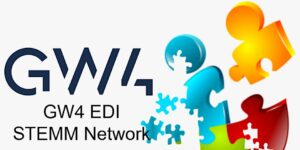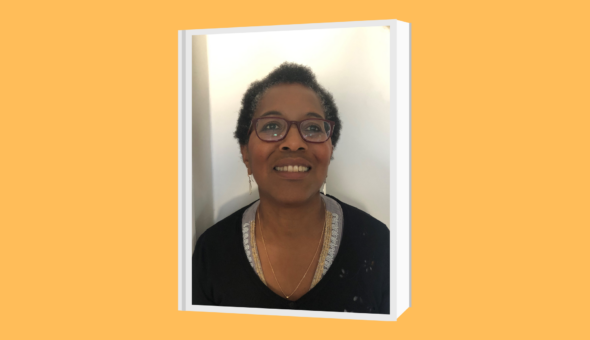
Guest Post written by Dr Sarah Bailey (Life Sciences):
The GW4 EDI STEMM hub held its first conference in Cardiff in September 2023. Under the theme of ‘Redefining the status quo in academia’ the programme focussed on 3 topics Recruitment, Retention & Promotion; Decolonising STEMM Curricula and Inclusivity and Accessibility.
Cardiff University were proud hosts of the first GW4 EDI STEMM conference, which aimed to bring together colleagues from the GW4 Universities, and beyond, to discuss systemic barriers within STEMM, share best practice and identify future actions the GW4 EDI STEMM Hub can take to remove these barriers.
The keynote presentation was from James Richards (Herriot Watt University, EDI Caucus) who informed the meeting about the UKRI and British Academy funded Equality, Diversity and Inclusion Caucus (EDICa). The purposes of EDICa are to create inclusive research and innovation cultures and enable diverse researchers to thrive in their careers, under the 3 main workstreams of Career Lifecycle (Workstream 1), Research Process (Workstream 2) and Organisation of Work (Workstream 3). Colleagues are invited to get involved by joining stakeholder engagement groups.
The session on ‘Recruitment, Retention and Promotion’, had Sally Hewlett (Bath) talk about her work on a project to support women’s career progression, the WomenCAN Project, which explores factors shaping the perception of women’s leadership capacities in relation to promotion criteria. Leda Blackwood and Tim Rogers (Bath) shared learning from an EPSRC funded project ‘Reimagining Recruitment’ with the aim to drive culture change around academic recruitment. The two key strands of the work being to examine the benefits of collaborative academic events for developing a diverse pool of researchers who see themselves in academia and to understand the experiences of early career researchers and senior academics in STEM around employment-related values and beliefs.
For the theme of ‘Decolonising and Diversifying STEMM curricula’, the conference heard about the barriers faced by multiple minoritized groups in entering and succeeding in STEMM careers. Lara Lalemi (Bristol) focused on decolonising the curriculum as a tool to addressing race inequality. Lara highlighted, the fact that people in minoritized groups succeed does not mean the system works, people that ‘make it’ are the exception, not the rule. A series of short talks on this subject revealed the excellent work being undertaken across the GW4 and opportunities for collegiate working beyond individual institutions.
For ‘Inclusivity and Accessibility’, Martin Nutbeem (Bristol) highlighted the importance of digital accessibility in providing an inclusive environment for students and the Web Content Accessibility Guidelines as an international standard to make web content more accessible to people with disabilities. Ceri Morris (Cardiff) spoke about the inclusive education framework at Cardiff University that has two key commitments: furthering social justice through evidence informed educational change and removal of systemic and cultural barriers and inequalities in education. Eleanor Townsend (Exeter) opened their talk on ‘Somewhere over the rainbow’ by reflecting on the societal change in their lifetime in relation to homosexuality and spoke to a best practice guide produced at the University of Birmingham that highlights a framework for LGBTQ inclusivity in higher education and resources such as 500 Queer Scientists to help raise the visibility of role models in STEMM. Layal Hakim (Exeter) spoke about taking action to support neurodiverse learners, with The Exeter Spectrum Project, working with the National Autistic Society, to introduce ‘autism champions’ across the University to support neurodiverse learners and understand the challenges in navigating University life as a person with ASC.
An Open Space discussion helped to identify the next steps for the GW4 EDI STEMM hub, including a focus on recruitment of PGR students and a deeper look into Research Culture.
Poster presentations about EDI initiatives at the University of Bath included Joanne Pike "Engineering students from diverse backgrounds to get enterprise and inclusive leadership training", Gwen Scott "Embedding contextualised inclusive activities in the Pharmacology curriculum" and Sarah Bailey "What, and how, to teach about ethnicity and race in Pharmacy and Pharmacology UG programmes?".
This GW4 EDI STEMM Hub event was supported by the GW4 Building Communities Development Awards and University of Bristol Research England Enhancing Research Culture Fund, to support a ‘community of practice’ in STEMM EDI across Bath, Bristol, Cardiff and Exeter Universities.
Organising Committee (picture):
Sarah Bailey (Bath), Claire Davies (Exeter), Cosimo Inserra (Cardiff), Caroline McKinnon (Bristol), Ricardo Maddalena (Cardiff), Amy Mosley (Bristol), Andrew Pye (Exeter), Maisha Reza (Exeter), Ana Alvarez Serra (Bath), M.D. Sharma (Exeter)

Respond
